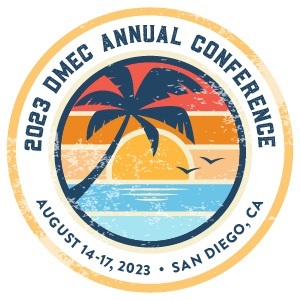
The absence and disability management specialty within human resources (HR) is getting more attention due to the passage of an increasing number of local, state, and federal leave laws along with high-ticket jury awards in the $25 million realm for employer noncompliance.
Amid that backdrop, hundreds of absence and disability management professionals attended the 2023 DMEC Annual Conference in August to learn about best practices and collaborate on solutions to shared challenges. They left with renewed energy, new contacts, and valuable resources to support employees during emotional times.
“You have one of the few jobs in the world where you can actually save someone’s life by removing barriers to absence and disability benefits,” said speaker Rachel Shaw, president of Shaw HR Consulting.
Knowing when and how to do that during accommodation discussions is where the complexity begins. As a result, opportunities to learn about successful tools and approaches help employers stay ahead of the curve when tracking and managing hundreds of leaves.
It also helps them reconnect with the human-centered piece of the profession that initially drew them in. “I get energized by the sessions,” said David Dubovich, CDMS, CLMS, disability case manager, North Memorial Health. “We’re dealing with more difficult personnel issues than we ever have. I have passion for this work, but we get burned out.”
Trusted Resources
Attending DMEC conferences helps create a trusted circle of like-minded professionals, an asset noted by Terri Rhodes, CCMP, CLMS, CPDM, MBA, during the annual conference — her last as DMEC CEO. “The connections I have made over the years at the DMEC conferences have made such a difference to me!”
Rhodes, who received a standing ovation, talked about the value of absence and disability managers shepherding employees through a maze of local, state, and federal HR laws as well as company policies that cover everything from short- and long-term disability to parental, caregiving, and bereavement leave; workers’ compensation; and more.
A theme that emerged during the four-day event was the value of ongoing manager education and training to ensure knowledge of disability and leave laws that protect employees and ensure prompt referral to leave professionals. When that process breaks down, employers pay a steep price for noncompliance, especially when cases are heard by juries that are increasingly sympathetic to employees, said legal experts.
“You’ve never heard of awards like these,” said speaker Marjory Robertson, JD, associate vice president, Sun Life Financial Inc., when citing cases including one in which a jury awarded $850,000 for past emotional distress and another $850,000 for future emotional distress. “We’re starting to see that change.”
During the “Cost of Compliance” session, Robertson and Megan Holstein, head of absence management for The Hartford, highlighted high-priced court cases that illustrate common vulnerabilities in employer policies and approaches. And many of them highlight a need for more compliance education and ongoing training to ensure supervisors and managers know what is appropriate (and legal) to say. “Their [manager and supervisor] comments sink the ship when it comes to a lawsuit,” said Holstein.
A Holistic Approach to Health
In addition to cautionary tales, conference speakers shared opportunities to help employees stay at work and return to work as soon as possible. A unique aspect to this year’s messaging was a focus on how employers can minimize the ways in which their environments affect employee mental health. While employers have increased investments in employee mental health, the emphasis should be on prevention, not reaction, said speakers, who talked about designing physically and psychologically safe workplaces.
The first educational session of the day featured a panel of mental health experts who shared sobering data about worsening mental health across all ages — though younger workers are especially hard hit — and its costs.
“Too often employers have [turned] a blind eye or have overlooked the ways in which their environment is influencing employee mental health,” said Joe Grasso, PhD, senior director, Workforce Transformation, Lyra Health. To flip that dynamic, panelists encouraged employers to assess their workplace environment and corporate culture to evaluate risks and engage employees in identifying solutions, some of which come at no additional cost.
Citing common psychosocial hazards of low job control and lack of role clarity, Grasso explained how these hazards — when left unaddressed — cost employers in myriad ways. “It isn’t just affecting the individual; it’s affecting the business” because employees affected by psychosocial hazards are 60% more likely to take sick days and go on disability. There are also increased costs with healthcare claims spend, greater absenteeism, and more. “It’s in everyone’s best interest to explore the ways in which work is affecting employee mental health,” he added.
Psychosocial hazards also influence an employee’s inclination and ability to return to work. “Giving people that sense of belonging, that inclusiveness … that is what makes the difference … because people are reluctant to go back to team environments that they see as unsafe,” said Paula Allen, global leader and senior vice president, Research and Client Insights, TELUS Health.
In addition to sharing tactical solutions to address declining mental health among employees, such as conducting psychosocial risk assessments and asking employees to brainstorm solutions to mitigate identified hazards, panelists shared international costs associated with mental illness. Citing $15 million in life insurance product claims, people with poor mental health have a 29% heightened risk of coronary heart disease and a 30% increased risk for having a stroke, said Adrita Bhattacharya-Craven, program director, Health and Aging, The Geneva Association. There is also an indirect cost to lost wages, sickness, and people who go on Social Security, which is 25% higher.
Actionable Guidance
Employers can have a positive influence by revising benefits programs, which frequently limit employee access to mental healthcare, addressing stigma by normalizing discussions about mental health and use of benefits, and developing employer resource groups.1
And benefit design can be adjusted. While there is a tendency for benefit packages to cover complex mental health treatments, such as psychiatric hospitals, the “bulk of the disease burden is coming from everyday working and living situations,” explained Bhattacharya-Craven. Changes can be made to adjust benefit designs and expand coverage. “We need to do things differently, and we need to get in there much, much sooner.”
The panel set a high bar for interactive sessions that focused on union involvement in the interactive process for accommodations covered by the Americans with Disabilities Act and Pregnant Workers Fairness Act, the use of psychedelic drugs to treat mental health issues, compliance with new paid leave laws, changes to state insurance codes that allow paid leave insurance products, and more.
Attendees participated in active question-and-answer opportunities with panelists and roundtable discussions, which provided opportunities to discuss employer challenges and learn how peers have addressed similar situations.
That ability to connect with peers is a valuable component of DMEC conferences, which have grown since the first conference was hosted in 1996. The association encourages strong networking throughout its two annual, in-person conferences as well as virtually with DMECommunities, an online platform for member discussion. To encourage excellence among members and recognize innovative approaches to absence and disability management, Rhodes presented two 2023 DMEC Emerging Leaders Awards2 and two 2023 DMEC Partnership Awards.
It was fitting that Rhodes opened this conference, her last as DMEC CEO, and Bryon Bass, CLMS, incoming CEO, delivered inspirational words on the final day and revealed the addition of a DMEC virtual mental health conference for employers in January 2024.
“In this field, we are not just administrators or experts in the intricacies of the law,” Bass told attendees. “We are advocates for change, champions of empowerment, and agents of hope. We hold the power to make a difference in someone’s life when they need it most — whether it is to care for their own or a family member’s medical condition, to seek time off to welcome a new child, or seek help to continue working with restrictions and limitations. The work we do transcends mere regulations and guidelines; it’s about humanity, empathy, and creating a level playing field for everyone.”
References
- DMEC. ERGs Help Break Down Mental Health Stigma by Engaging and Supporting Employees. Aug. 24, 2022. Retrieved from https://dmec.org/2022/08/24/ergs-help-break-down-mental-health-stigma-by-engaging-and-supporting-employees/
- DMEC. Celebrating Leadership in Absence and Disability Management Circles. Sept. 18, 2023. Retrieved from https://dmec.org/2023/09/18/celebrating-leadership-in-absence-and-disability-management-circles/











